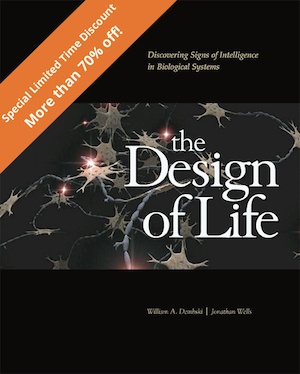 Evolution
Evolution
 Intelligent Design
Intelligent Design
In The Design of Life, Dembski and Wells Offer a Powerful Survey of the Case for Intelligent Design
To really appreciate the evidence for intelligent design, do you ever get the feeling you need several shelves of weighty tomes by design theorists, a great deal of time for reading and understanding them, and a PhD in biology, math, or philosophy wouldn’t hurt either?
At the same time, the question of whether life’s history bears the imprint of purposeful guidance is an ultimate question. Perhaps the ultimate question for every person to consider.
 Shouldn’t weighing the inference to design be readily comprehensible to any thoughtful adult? Surely the folks at Discovery Institute owe it to the public to offer a slim and attractive, one-volume survey of the evidence for ID, authored by top ID scholars but also an easily accessible read, something you could, perhaps, give as a gift to a curious friend who you know perfectly well isn’t going to wade through a whole library of ID works? But who might read one book…
Shouldn’t weighing the inference to design be readily comprehensible to any thoughtful adult? Surely the folks at Discovery Institute owe it to the public to offer a slim and attractive, one-volume survey of the evidence for ID, authored by top ID scholars but also an easily accessible read, something you could, perhaps, give as a gift to a curious friend who you know perfectly well isn’t going to wade through a whole library of ID works? But who might read one book…
Or put it a different way: How about a book that gives a view of the forest of ID evidences from high above, rather than one tree, however magnificent? Come on, Discovery Institute, give it to us!
Well, guess what? We did, and it’s here. It is The Design of Life: Discovering Signs of Intelligence in Biological Systems, by mathematician and philosopher William A. Dembski and molecular and cell biologist Jonathan Wells. Both are Senior Fellows of the Center for Science & Culture, prolific authors and star scholars, decorated with advanced degrees from the University of Chicago, Yale, and UC Berkeley.
No less important than their academic distinctions, they also have a gift for explaining difficult scientific ideas in clear, inviting prose. That’s what they do in The Design of Life, published originally by the Foundation for Thought and Ethics, now available to celebrate the launch of a new imprint of Discovery Institute Press, Foundation for Thought and Ethics (FTE) Books.
Through July 8, we will be selling the book for only $10 — that’s more than a 70 percent discount! And it includes both the full-color hardcover and an accompanying CD with additional materials. Order now, because this special discount won’t last long!
The Design of Life hits all the most fascinating challenges to orthodox evolutionary theory posed by top ID advocates, and the most substantial reasons for substituting Design for Darwinism. It’s all here! Dembski and Wells survey the case for ID with sections on “Human Origins,” “Genetics and Macroevolution,” “The Fossil Record,” “Similar Features,” “Irreducible Complexity,” “Specified Complexity,” “The Origin of Life,” and concluding with an Epilogue, “The ‘Inherit the Wind’ Stereotype.”
All that in fewer than three hundred pages, with handsome color photos and illustrations, in a study and slim hardcover edition. In addition, each section concludes with thought-provoking Discussion Questions, which make The Design of Life the perfect guide and companion for your study group.
Another key figure in ID’s scientific community, biochemist Michael Behe, says, “When future intellectual historians list the books that toppled Darwin’s theory, The Design of Life will be at the top.”
If overturning a stale, overbearing relic of 19th century materialism represents a challenge not only of persuading scientists but in explaining the relevant science to the lay public, then that would have to be true. This is the broad overview of ID that has been missing from your reading list.
Design in biology is real, not an illusion. Not convinced? Still uncertain that you’ve understood the inference to intelligent design? The Design of Life seals the deal. If you haven’t read this wonderful book, now is your chance!
Photo credit: © Sergey Nivens — stock.adobe.com.

